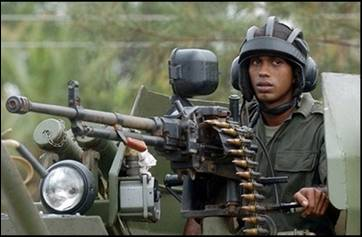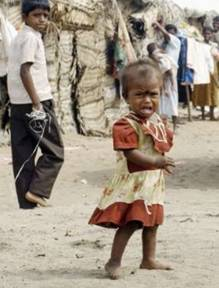TAMIL NATIONAL FORUM
Selected Writings -
Fr.
Chandiravarman Sinnathurai
Sri Lanka: The Undeclared Dirty War
19 January 2007
"..I wish to ask the question again: What is still the
obstacle in the Sinhala mind in recognizing the Tamils as a nation in
order to live side-by-side, as neighbours with peace and harmony? One
has to admit that the writers, intellectuals, artistes, poets and others
have a public role to play in this human crisis � a cry for freedom.
Each side must possess intellectual integrity and deep honesty for the
sake of common humanity. I should think none would want the suppression
of the Tamils to continue. Talk of federalism is a pie in the sky, quite
frankly..."
Recently I wrote to a Sinhala editor of an English language
newspaper in Colombo asking the following questions:
 "It
makes me wonder whether it is hubris or mockery on the part of the SLMM [Sri
Lanka Monitoring Mission] to recently declare that the CFA [Ceasefire
Agreement] is still alive and active. A lawyer said to me that "technically
the SLMM are correct". In light of SLMM's declaration, one has to consider
however, what is happening in the east, in Vaharai - thousands of innocent
civilians including children are trapped and are starving whilst being
attacked by aerial bombardment. A similar situation is witnessed in the
North. Is the government 'technically correct' in engaging in such human
rights abuse? "It
makes me wonder whether it is hubris or mockery on the part of the SLMM [Sri
Lanka Monitoring Mission] to recently declare that the CFA [Ceasefire
Agreement] is still alive and active. A lawyer said to me that "technically
the SLMM are correct". In light of SLMM's declaration, one has to consider
however, what is happening in the east, in Vaharai - thousands of innocent
civilians including children are trapped and are starving whilst being
attacked by aerial bombardment. A similar situation is witnessed in the
North. Is the government 'technically correct' in engaging in such human
rights abuse?
I also wish to ask, after many moons of blood shed, what is 'technically
wrong' in accepting and recognizing the Tamils as a nation? They have a
distinct language, culture, tradition, heritage and history. What is the
fundamental stumbling block?
In the United Kingdom, the English have no qualms in recognizing the Scots
and the Welsh as distinct nations. Even a Scot could become the next labor
Prime Minister!
Are we not caught in an archaic mind trap of a single nation concept and as
a result, no solution is a solution except to play in the hands of
international forces to the tragedy of all our people.
How much more blood has to be shed to be proven that "technically" the
country is ruined and the future generations are doomed to reap the fruits
thereof.
The
un-declared war in Sri Lanka has caught a fever pitch. The plight of Tamil
civilians in the North and East has degenerated to an appalling humanitarian
crisis. In Batticaloa town [in the East], multitude of Internally Displaced
People from the
Vaharai region have started to literally beg for their food. The Government
seems to show no concern or compassion to these Tamils. In the Jaffna peninsula,
the situation is much worse than stark.
The value for human life has dangerously deteriorated.
Another worrying trend is that this so-called �undeclared war� has transmuted
into a tribalistic dirty war. It is indeed degenerating into more than a racial
conflict. Ground reality suggests that things have transformed itself into a
savage ethno-religious war. The politico-Bhikkus alongside the pseudo-Marxists
have made abundantly clear that that is the path this war will follow. Many
clerics of minority faiths have sadly been abducted in recent months, never to
be seen again. Some Christian priests and pastors have faced extrajudicial
execution. [http://transcurrents.com/tamiliana/archives/270
]
Dayan Jayatilleka (aka Anuruddha Tilakasiri) in his �Death of a Thousand Cuts�
article dated 27 April 2006 [Ceylon Daily News] warned, aside his diatribes,
against such a deterioration. Of course, Jayatilleka would want the Government
to win the war � hook or by crook However he accepts that this is a war of
attrition. That brings beyond all some clarity. Nevertheless, in order to claim
the �high moral ground� by the State, according to Jayatilleka, this war cannot
and should not stoop to tribalism.
Jayatilleka referring to his father writes: �Mervyn de Silva often warned in the
Lanka Guardian, that the East is our Bosnia, and if he was right, it is
important that we not be Milosevic�s Serbia in that scenario. If we play the
Serbs, we�ll wind up like them.�
Alas!
Lanka Guardian�s prediction about the East is a ground reality now. Whether
President Rajapaksha & brothers will end up like Milosevic (not forgetting the
war crimes of previous president Chandrika Bandaranayke) is a question for the
international community.
Jayatilleka puts Dong�s question �who are our enemies and who are our friends?�
and then he responds by stating that the LTTE [The Tamil Tigers] is the main
enemy of the state and Karuna [defected faction of the former Eastern commander]
is our friend. In order to understand what lies behind this response,
Taraki�s writing puts
things into perspective:
"One of the main speakers in the Stalinist Study Circle (
STC), who spoke about the Tamil rights and their right for self
determination and who justified the Tamils armed struggle, was Dayan
Jayatilleke. Not only that, he and his comrades formed an armed organisation
called "Vikalpa Kandayama."
What is Jayatillake, a person who moved intimately with the Tamil liberation
organisations, doing today? Today, he writes without cease how the Tiger
liberation struggle should be crushed.
Once an extreme opponent of American imperialism Jayatillake writes week
after week emphasizing that Sri Lanka should seek collaboration with the US
to crush the military power of the Tamils.
In those days Jayatillake used to write and say that we must go beyond
Sinhala-Tamil differences and fight against American imperialism and fight
for the class struggle.
Such a nice friend of mine, Dayan Jayatilleke, now writes in the Island
newspaper that "We [i.e. the Sinhalese and Sinhala nation] must seek the
support of the US to crush the military power of the Tamils." What happened
to him? [Excerpts from The
Psyche of the Sinhala Nation, 10 October 2004]
 In
such a humanitarian crisis and
appalling
human rights breaches in Sri Lanka one has to draw the line, stop and think
about the suffering humanity here. Children have suffered the most. Starvation,
abuse, and constant threat to life. While speaking to a group of 19-20 year old
lads, they said to me that they have known nothing else since their childhood,
but conflict and war. They have not experienced peaceful co-existence. In
such a humanitarian crisis and
appalling
human rights breaches in Sri Lanka one has to draw the line, stop and think
about the suffering humanity here. Children have suffered the most. Starvation,
abuse, and constant threat to life. While speaking to a group of 19-20 year old
lads, they said to me that they have known nothing else since their childhood,
but conflict and war. They have not experienced peaceful co-existence.
I wish to ask the question again: What is still the obstacle in the Sinhala mind
in recognizing the Tamils as a nation in order to live side-by-side, as
neighbors with peace and harmony?
One has to admit that the writers, intellectuals, artistes, poets and others
have a public role to play in this human crisis � a cry for freedom. Each side
must possess intellectual integrity and deep honesty for the sake of common
humanity. I should think none would want the suppression of the Tamils to
continue. Talk of federalism is a pie in the sky, quite frankly. The Sinhala
majority are opposed to it. The late Edward Said had something crucial to say in
his brilliant piece � The
Public Role of Writers and Intellectuals. I end with an excerpt:
"...The Peace cannot exist without equality: This is an
intellectual value desperately in need of reiteration, demonstration and
reinforcement. The seduction of the word itself--peace--is that it is
surrounded by, indeed drenched in, the blandishments of approval,
uncontroversial eulogizing, sentimental endorsement. The international media
(as has been the case recently with the sanctioned wars in Iraq and Kosovo)
uncritically amplify, ornament, unquestioningly transmit all this to vast
audiences for whom peace and war are spectacles for delectation and
immediate consumption. It takes a good deal more courage, work and knowledge
to dissolve words like "war" and "peace" into their elements, recovering
what has been left out of peace processes that have been determined by the
powerful, and then placing that missing actuality back in the center of
things, than it does to write prescriptive articles for "liberals," � la
Michael Ignatieff, that urge more destruction and death for distant
civilians. The intellectual can be perhaps a kind of countermemory, putting
forth its own counterdiscourse that will not allow conscience to look away
or fall asleep. The best corrective is, as Dr. Johnson said, to imagine the
person whom you are discussing--in this case the person on whom the bombs
will fall--reading you in your presence."
|